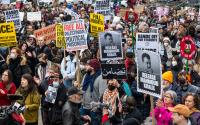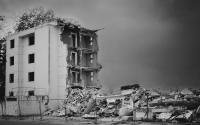America must understand why the Third World still distrusts its power
'The US and Britain are wrong to dispense their brand of instant justice in Afghanistan'
Independent, 25 October 2001
The United States, now the world's only super power, may well manage to batter the ignominious Talibans into submission, and finally to install in Afghanistan the kind of pro-West government the Americans and their allies are so desperate to put into office. They may even manage to run the place by remote control from Washington DC and London, with a government in Kabul taking instructions from America and its allies.
That, however, will not come anywhere near solving the serious image problem which America suffers internationally, but especially in the developing world where it is roundly condemned as a hypocritical country which preaches and practises democracy at home while destabilising other – often poor – countries. For as long as the US continues to be a bully which respects international institutions like the United Nations only insofar as they lend credence to various American actions abroad, the US will continue to have enemies in the developing world.
Lest there be misunderstanding, let me hasten to say that I believe the 11 September attacks on the US were barbarism of the worst kind, indicating the levels of depravity to which human beings are capable of sinking. They were the worst form of terrorism, and both the US and the international community should not rest until those responsible for such vile deeds have been tracked down, prosecuted and put safely behind bars.
However, the US and its ally, Britain, both of which like to be thought of as progressive, democratic countries which respect the rule of law, are wrong to dispense their brand of instant justice in the way they are doing in Afghanistan.
They are wrong to have embarked on the terrible bombing campaign which claims innocent lives and so badly pulverises an already poor country, while those who gave instructions for the 11 September acts of terror are safe in their hideouts.
Once the US and Britain are done with their bombing campaign and installed in Kabul the kind of West-friendly government they want, they will have to ask themselves why it is that the US inspires so much hatred among many in developing countries. Far more constructive than pretending that this pervasive anti-US sentiment does not exist will be to work towards changing that country's negative image.
At the heart of the problem is the duplicitous nature of American foreign policy, which has been responsible for thousands of deaths around the world over the years.
Going back to the years of the Cold War, when the United States still competed with the former Soviet Union for international dominance, America has repeatedly spoken the language of democracy at home while warmly embracing – and working with – tyrants abroad.
In the Philippines and in Haiti, the US supported the dictators Ferdinand Marcos and Jean-Claude Duvalier respectively, against local citizens who were fed up with their dictatorship and wanted democratic rule.
Both President Ronald Reagan and his counterpart in Britain, Prime Minister Margaret Thatcher, turned a blind eye to apartheid in South Africa and the concomitant murders of the country's blacks by apartheid's police and soldiers. They continued to be close friends with South Africa and to be staunch defenders of its white minority rulers. Instead of voluntarily isolating apartheid South Africa, they continued with Chester Crocker's "constructive engagement" with a country practising a system which had been condemned by the United Nations as a crime against humanity. In the end, US lawmakers – taking their cue from the actions of groups like TransAfrica who mounted daily protests outside the South African Embassy in Washington DC and called for sanctions against Pretoria – passed the Comprehensive Anti-Apartheid Act against the wishes of President Reagan, whose veto they overrode.
In South America the US, through its support for pro-American rebels like the Contras, culminating in the Contragate scandal which saw Oliver North becoming the fall guy, destabilised many countries. In Africa the US supported and financed numerous dictators over the years, regardless of the fact that they had not been elected democratically, simply because they made the right noises about capitalism and the West.
Both in Africa and in other parts of the world, America armed and financed bandits like Jonas Savimbi to topple governments it did not like. Internationally, the US has tended to be similarly arrogant, always seeking to use its political and economic power to blackmail others. For instance, at times America did not pay its dues to the United Nations because it disagreed with some of the resolutions and decisions of the world body. Yet, when it needs the international community's support for some of its controversial actions, such as the present bombing of Afghanistan, America quickly pays up and becomes a responsible member of the United Nations.
Until six weeks ago the isolationist President George Bush was taking his country out of important international accords like the Kyoto agreement on global warming, and generally telling the world to go and get lost. America, he implied, knew best and did not need the international community – and yet the first thing he did after 11 September was to give the world an ultimatum, saying it was either with the United States or against it in the fight against terrorism.
Those responsible for the 11 September carnage should be hunted down and prosecuted, preferably in a neutral country. However, after destruction of the indigent, innocent people of Afghanistan, the US would do well to seriously review its foreign policy towards the developing world. It is the arrogance and hypocrisy of that policy, after all, which has gained the US so many enemies.
A good starting point might be a strong denunciation of all acts of terrorism in the Middle East but especially those committed by the government of Israel, which has killed up to six Palestinians for every one of its citizens killed, and show an even-handedness in that conflict instead of blind support. For as long as there is no Palestinian state and the US continues to be partisan in the conflict, so long will the US continue to be hated in the developing world.






